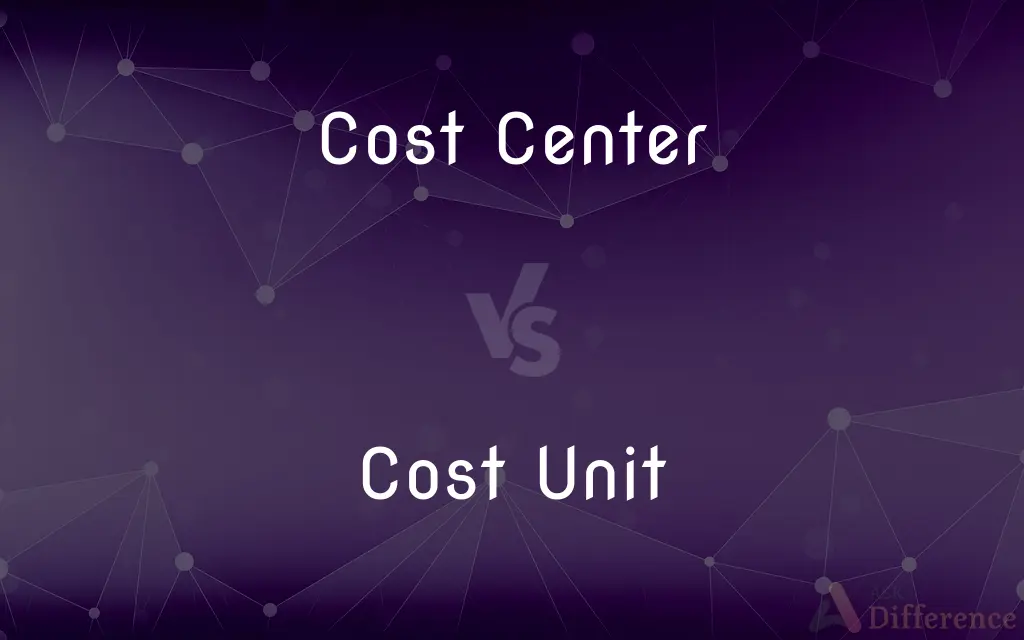Cost Center vs. Cost Unit — What's the Difference?
By Tayyaba Rehman — Published on January 16, 2024
A Cost Center is a department or area where costs are incurred, while a Cost Unit is a standard measure used to assign costs to products or services.

Difference Between Cost Center and Cost Unit
Table of Contents
ADVERTISEMENT
Key Differences
A Cost Center in business accounting is a specific department or segment of a business where costs are incurred. Its main purpose is to track expenses, making it easier to evaluate the efficiency and profitability of different segments. Cost Units, on the other hand, are the standard measurement units (like hours, kilograms, units produced) used to allocate costs to products or services.
The concept of a Cost Center is closely related to managerial accounting and budgeting. It helps in identifying areas of a business that are generating costs but not directly profits, such as a customer service department or an IT department. In contrast, Cost Units are used in cost accounting to determine the cost per unit of output, which is crucial for pricing and profitability analysis.
Cost Centers do not directly contribute to the profit but are essential for the operational efficiency of a business. They are more about controlling and monitoring costs. Cost Units, however, are directly linked to the products or services offered and are critical in assessing the per-unit cost for producing or delivering them.
The management of a business uses the analysis of Cost Centers for budget allocation and cost control purposes. Whereas, understanding and computing Cost Units are fundamental in setting sale prices, managing resources, and optimizing production.
In summary, Cost Centers focus on where the costs are occurring within the business, mainly for internal efficiency and control. Cost Units, conversely, are utilized for external financial purposes, such as pricing strategies and competitive analysis.
ADVERTISEMENT
Comparison Chart
Definition
Department or area incurring costs
Measure used to assign costs to products/services
Purpose
Track and control expenses
Determine cost per unit of output
Relation to Profit
Indirect, focuses on cost control
Direct, key in pricing and profitability
Use in Business
Managerial accounting, budgeting
Cost accounting, resource management
Example
Customer service department, IT department
Per hour of labor, per kilogram of material
Compare with Definitions
Cost Center
Helps in tracking where costs are incurred within a business.
The company's cost centers were analyzed to reduce overhead costs.
Cost Unit
A standard measure for allocating costs to products or services.
The cost unit for the product was determined per unit produced.
Cost Center
A segment of a business monitored for its cost efficiency.
They reviewed the marketing department as a cost center to optimize spending.
Cost Unit
Essential for pricing and profitability analysis.
They used labor hours as a cost unit for service pricing.
Cost Center
Essential for internal management and cost control.
Our customer service unit operates as a crucial cost center.
Cost Unit
Helps in managing resources and optimizing production.
Determining the appropriate cost unit is key in cost management.
Cost Center
A department within a business that incurs expenses but does not generate direct profits.
The IT department is considered a cost center due to its operational expenses.
Cost Unit
Used in cost accounting for financial purposes.
Cost units were assessed to analyze the product's market competitiveness.
Cost Center
Used for budgetary and control purposes in a company.
Each cost center in the company has its own budget to manage.
Cost Unit
Used in calculating the cost per unit of output.
Cost units help in setting the price for each manufactured item.
Common Curiosities
Can a cost center generate revenue?
Typically, a cost center does not directly generate revenue; it incurs costs for operational purposes.
What is the main purpose of a cost center?
To track and control expenses within a specific department or area of a business.
Can a cost center be a profit center too?
No, cost centers are distinct from profit centers, which are directly responsible for generating revenue.
How do cost centers aid in budgeting?
By providing detailed insights into where and how expenses are incurred, aiding in efficient budget allocation.
How do cost units impact profitability?
They help businesses understand the cost of producing goods or services, impacting pricing and profitability.
How is a cost unit used in business?
To allocate costs to products or services and determine cost per unit of output.
Who manages a cost center?
Typically, a department head or manager oversees a cost center’s budget and expenses.
What are examples of cost units?
Examples include hours of labor, kilograms of materials, or units produced.
Do cost units help in resource management?
Yes, they are essential for efficient resource allocation and production optimization.
How often are cost centers evaluated?
They are usually evaluated regularly, often during annual budgeting or in financial reviews.
Is a cost unit important for pricing strategies?
Yes, understanding cost units is crucial for setting accurate and competitive prices.
How does a cost center affect financial reporting?
It provides detailed expense data, helping in accurate financial analysis and reporting.
Can a business have multiple cost centers?
Yes, large businesses often have several cost centers, each with its own specific function and budget.
Are cost units the same across industries?
No, they vary depending on the industry and the nature of the product or service.
Is it necessary for all businesses to have defined cost units?
For effective cost management and pricing, having defined cost units is very beneficial.
Share Your Discovery

Previous Comparison
SunPower vs. Sunnova
Next Comparison
LXC vs. LXDAuthor Spotlight
Written by
Tayyaba RehmanTayyaba Rehman is a distinguished writer, currently serving as a primary contributor to askdifference.com. As a researcher in semantics and etymology, Tayyaba's passion for the complexity of languages and their distinctions has found a perfect home on the platform. Tayyaba delves into the intricacies of language, distinguishing between commonly confused words and phrases, thereby providing clarity for readers worldwide.













































